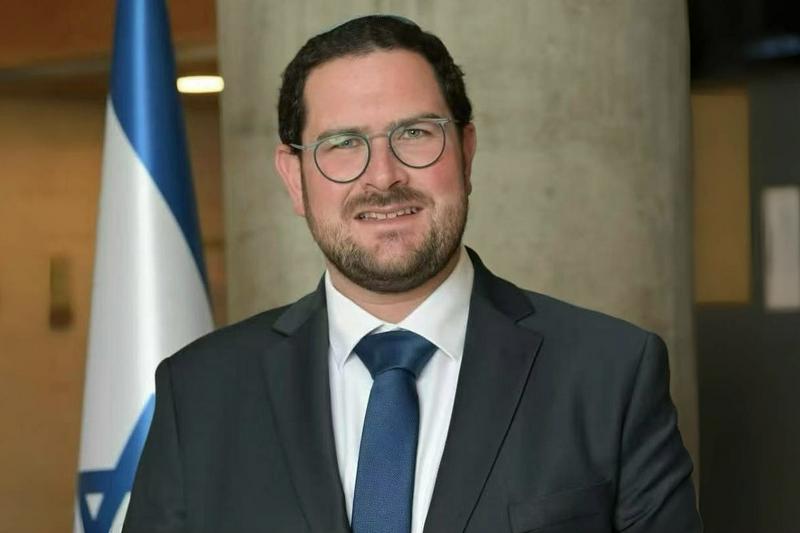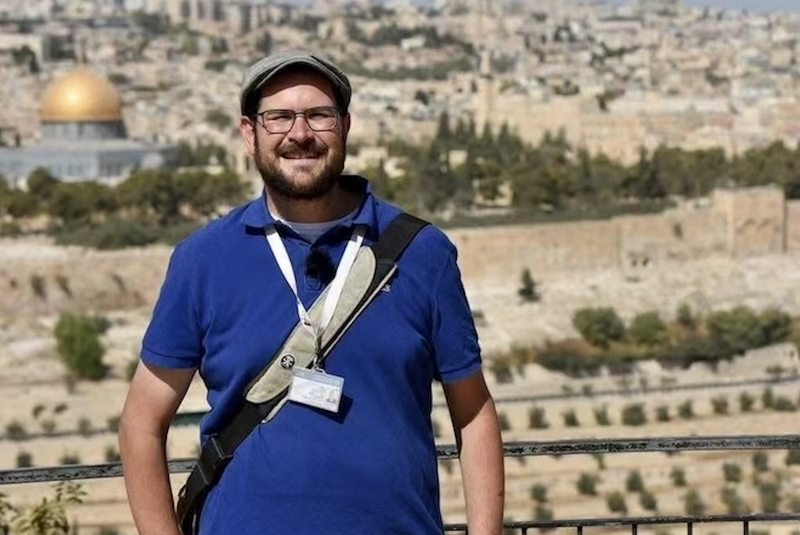Editor's note: Samuel Kahn, recently appointed Deputy Consul General of Israel in Shanghai, sat down with China Christian Daily to share his impressions of China, his vision for strengthening Israel–China relations, and his reflections on Jewish culture and interfaith dialogue. With a background spanning diplomacy, education, and advocacy, Kahn discusses lessons from Jewish history, the significance of community and identity, and the importance of building bridges between Jews and Christians for peace and cooperation.
China Christian Daily: Could you please introduce yourself and share your impressions of Shanghai and China over the past few months?
Samuel Kahn: I arrived in Shanghai a few weeks ago, and I find it to be a vibrant and dynamic city, rich in culture and history, alongside its impressive skyline and excellent cuisine. I have already spent several Sundays traveling and visiting historical sites. Just yesterday, I visited the Jewish Refugees Museum and was deeply moved by the story of how the people of Shanghai welcomed and sheltered around 20,000 Jewish refugees during the Holocaust. My family will be joining me soon, and I look forward to spending time here with my three children in this remarkable city.
China Christian Daily: Your experience spans diplomacy, education, and advocacy for people with special needs. How have these diverse roles shaped your understanding of dialogue between different faiths and cultures? What are your expectations for your future work as Deputy Consul General?
Samuel Kahn: I come from a variety of professional backgrounds—as a tour guide, an educator, and a diplomat. What connects all of these roles is the mission of representing Israel. Whether guiding visitors through the landscapes of Israel, teaching about Israeli history and culture, or serving as a diplomat, my goal is to share Israel's diversity and richness with others. Israel offers a unique combination of ancient history, archaeology, and breathtaking landscapes, as well as modern, innovative cities like Tel Aviv, known for its vibrant culture and startup ecosystem. As Deputy Consul General, my aim is to further strengthen the already positive relationship between Israel and China and take it to an even higher level.
China Christian Daily: As an educator who has taught Jewish culture and Israeli studies, what do you think are some common misconceptions or knowledge gaps the Chinese public might have about Jewish culture and Israeli history?
Samuel Kahn: One common misconception is that there is a single way to define Jewish identity. In fact, Judaism is incredibly diverse. There are Ashkenazi Jews, primarily from Europe; Sephardic Jews, originating from North Africa; Jewish communities historically in China; and others from regions such as Morocco. There is no single stereotype that can describe all Jews. Some live secular lives, while others, like myself, live according to religious traditions. I believe there is still much the world needs to learn, especially about modern Israeli history over the past 77 years.
China Christian Daily: What do you think are the most important lessons Christians in China can learn from the Jewish experience of preserving faith and identity across centuries and diaspora?
Samuel Kahn: One of the most important principles in Judaism is maintaining a sense of community and preserving one's identity. This is something Christians in China can relate to, as Chinese communities are also spread around the world, whether in New York, San Francisco, or beyond. Wherever I go, I can always connect with a Jewish or Israeli community, and I believe this shared experience of community and continuity is something valuable we both hold in common. Moreover, both Jews and Christians share the same spiritual roots, tracing back to Abraham, the Old Testament, and the same God.
China Christian Daily: Israel places great importance on tourism, and you are also a licensed tour guide. As many Chinese Christians have undertaken or are planning pilgrimages to the Holy Land, what do you hope these Christian tourists will gain from their visits?
Samuel Kahn: The Bible can be studied anywhere in the world, but visiting Israel allows people to experience the Scriptures in a unique and powerful way—walking in the very places described in the text. It is an encounter that brings history to life. Israel is a place where the past and the future meet in a profound way. I hope that when Chinese Christian visitors come, they not only study the Bible but also feel it—connecting spiritually, experiencing the land firsthand, and praying for a brighter future.
China Christian Daily: In your view, how can interfaith initiatives between Jews and Christians contribute to global peace and cooperation?
Samuel Kahn: The Abraham Accords are a prime example of how dialogue and shared values can lead to peace between nations that previously had no diplomatic ties. By focusing on our common roots and shared values, rather than our differences, we can move forward together. At Israel's Ministry of Foreign Affairs, we run a program called MASHAV, which shares Israel's expertise in various fields with countries around the world. In Judaism, we have the concept of Tikkun Olam—"repairing the world." Through collaboration, Jews and Christians can walk together on the path of peace and healing.
China Christian Daily: What advice would you give to young Chinese people who want to learn more about Israeli culture or are considering studying or working in Israel?
Samuel Kahn: I would encourage them to immerse themselves in Israeli culture—listen to Israeli music, read Israeli books and newspapers, and even try Israeli food at a local restaurant. But most importantly, I would urge them to visit Israel in person.
China Christian Daily: Do you have any words for Chinese Christians?
Samuel Kahn: I would like to sincerely thank Chinese Christians for their support, prayers, and for everything they do for us. I. It means a great deal to us. I hope that we will meet next year in Jerusalem, in peace.
View the interview video here













